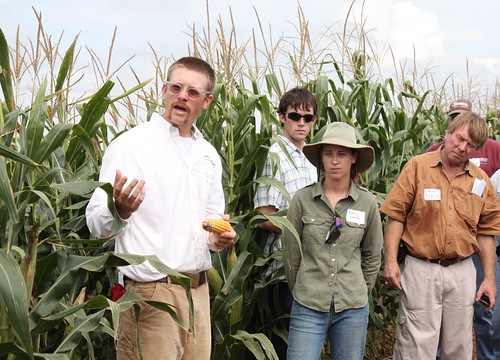
Dr. Seth Murray, a Texas A&M AgriLife Research corn breeder from College Station, talks about his work during a field day. (Texas A&M AgriLife Research photo by Li Zhang)
NOTE: This week on the USDA Blog, we’ll feature the stories of America’s Harvest Heroes who, like farmers across the nation, are working this harvest season to secure the bounty of healthy food American agriculture is renowned for. From laying the foundation for the next generation of farmers putting down roots in rural America, supporting the fruit and vegetable growers who are helping to build healthier communities, bolstering new markets for the products of agricultural innovation, to harvesting renewable energy that is made in Rural America, with USDA’s support our farmers are yielding strong results for every American Today, we look at a Hero of a different type. Dr. Murray is not necessarily on a tractor, but his import research is helping Southern corn growers realize higher yields when they bring in their harvest.
Dr. Seth Murray grew up in suburban Michigan and, after spending time on his grandfather’s farm, knew from a young age he wanted to work with plants. Today, he conducts corn breeding research at Texas A&M University and recently published findings that could mean big things for the corn producers of Texas and the American Southwest region – a greater harvest of disease-free corn and more food on the tables of consumers.
Growing corn in Texas can be tough. Drought can stress the plants, and when plants are in a stressed weakened condition, they are susceptible to a mold, or fungus, called aspergillus flavus. A. flavus produces aflatoxin, a toxic and carcinogenic compound dangerous to animals and humans. Aflatoxin is estimated to cost the United States alone $225 million per year in lost yield.
Murray designed a research program and received an award in 2010 from the U.S. Department of Agriculture’s National Institute of Food and Agriculture (NIFA) to examine the change in corn yield in Texas during the past decade. With a $500,000 Agriculture and Food Research Initiative grant for plant breeding and education, Murray and his team of graduate student researchers found that producers in the Midwest have seen increased yields while those in Texas have not. Murray then looked to see if there was a genetic reason for the differences in yields for the same seed.
To study corn with greater genetic diversity, the team crossed tropical corn genes with the temperate corn, which enabled the team to find genes that benefit yield in both irrigated and dryland conditions.
In subsequent planting with the team’s new variety, they found alleles (mutated genes that affect hereditary traits) worked well under both dry and well-watered conditions, which according to Murray, “is really exciting, because that doesn’t always happen. Usually if a variety works well under drought, it doesn’t do well in well-watered conditions, and vice versa.”
When the researchers combined three alleles, the yield increased 15 bushels an acre. Increased yield typically means a the plant will be more stress resistant, and more stress resistant plants tend to stand up better against aflatoxin-causing A. flavus, an opportunistic disease.
Murray’s work will eventually result in corn better adapted to the South, where the growers have different needs than those in the Midwest. Southern growers will benefit from higher yields and increased stress resistance in corn, contributing to a safer and more secure food supply throughout the country.
NIFA invests in and advances agricultural research, education, and extension and seeks to make transformative discoveries that solve societal challenges.
No comments:
Post a Comment
Note: Only a member of this blog may post a comment.